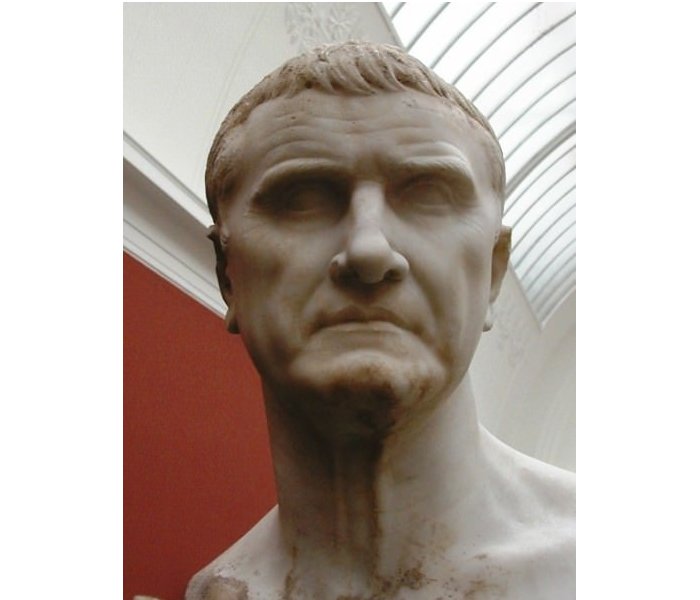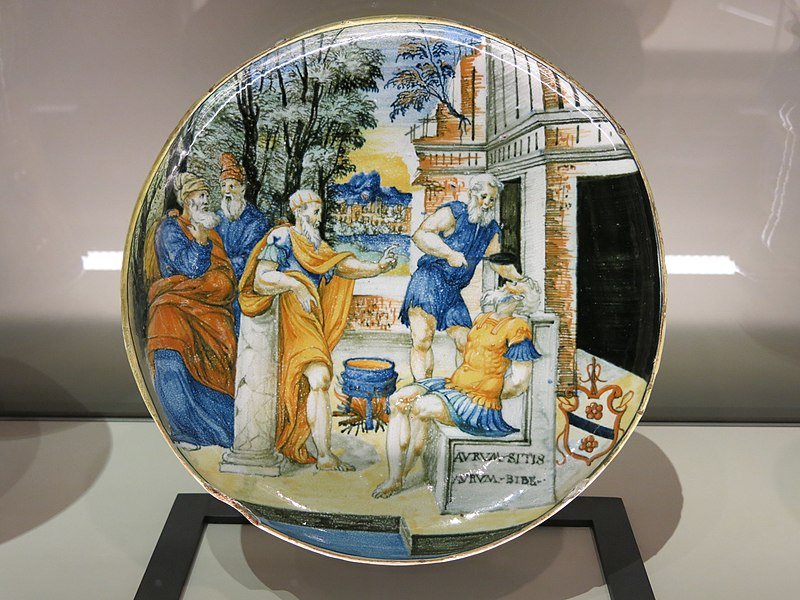Did Crassus, Ancient Rome’s Wealthiest Man Really Die From Drinking Molten Gold?
Ellen Lloyd - AncientPages.com - Marcus Licinius Crassus (c. 115 B.C. —53 BC.) was a Roman general and politician. Today, he is remembered as the wealthiest man in ancient Rome, suppressing the slave revolt led by Spartacus and forming the so-called First Triumvirate with Julius Caesar and Pompey to challenge the Senate's power effectively.
A bust of Roman statesman and general Marcus Licinius Crassus (c. 115-53 BCE). Glyptothek, Copenhagen. Image credit: Diagram Lajard - Public Domain
When Crassus died, a Civil War broke out between Caesar and Pompey. According to some historical sources, Crassus died from drinking molten gold, but is this really true?
Crassus was born a wealthy man but lost his entire inheritance during the Marian-Cinnan proscriptions. He was forced to flee to Hispania (the Roman name for the Iberian Peninsula).
Crassus got his revenge while commanding the left wing of Lucius Cornelius Sulla's army, making a fortune from proscriptions himself.
Soon Crassus became a wealthy man. He earned his fortune from prescriptions, slave trafficking, judicious purchases of land and houses, and purchases of burning property.
Ancient Roman army and their general. Credit: Adobe Stock - vukkostic
Prescriptions were only part of his overall wealth. It is said that after receiving word of houses being on fire, Crassus would arrive with an army of 500 "firefighters" and attempt to offer a modest sum for the property. Crassus would let the property burn to the ground if the offer was refused.
Crassus became a politician and used his wealth to gain support from senators. However, wealth was not enough to give Crassus the power he wanted. Crassus needed a military victory to consolidate his grip on power and make a name for himself in military matters. Crassus used Syria as the launchpad for a military campaign against the Parthian Empire, Rome's long-time Eastern enemy.
The Parthian people had established an empire that lasted almost 500 years, from the mid-3rd century BC until 224 CE. Crassus' military campaign was a disastrous failure, resulting in his defeat and death at the Battle of Carrhae.
It remains unknown whether Crassus died fighting or committed suicide to prevent being captured.
Historian Cassius Dio wrote that the enemy “poured molten gold into his mouth. The torture of Crassus. Faience. Circa 1530-1540 - Louvre Museum. Credit: Tangopaso - Public Domain
Crassus was well-known for being greedy. Plutarch said that "before he (Crassus) went upon his Parthian expedition, he found his possessions to amount to seven thousand one hundred talents; most of which, if we may scandal him with a truth, he got by fire and rapine, making his advantages of the public calamities." He died in pursuit of wealth from Asia."
The rumor about "dying from drinking molten gold" can be traced to historian Cassius Dio who wrote that having discovered his body, the enemy "poured molten gold into his mouth in mockery for he had set great store by money."
Where and how exactly Dio obtained this information is unknown, but it helped Roman prejudices about Parthian brutality.
Written by - Ellen Lloyd – AncientPages.com
Updated on February 11, 2023
Copyright © AncientPages.com All rights reserved. This material may not be published, broadcast, rewritten or redistributed in whole or part without the express written permission of AncientPages.com
Expand for referencesMore From Ancient Pages
-
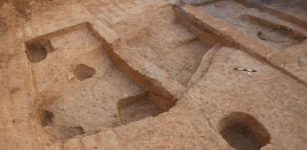 6,500-Year-Old Copper Workshop Unearthed In Negev Desert
Archaeology | Oct 6, 2020
6,500-Year-Old Copper Workshop Unearthed In Negev Desert
Archaeology | Oct 6, 2020 -
 Face Of Norwegian Boy Who Lived 8,000 Years Ago Reconstructed
Archaeology | Mar 16, 2023
Face Of Norwegian Boy Who Lived 8,000 Years Ago Reconstructed
Archaeology | Mar 16, 2023 -
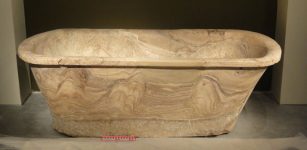 Where Were Herod The Great’s Royal Alabaster Bathtubs Quarried?
Archaeology | May 17, 2022
Where Were Herod The Great’s Royal Alabaster Bathtubs Quarried?
Archaeology | May 17, 2022 -
 Orang Bunian: Mysterious Invisible Whistle People Living In Forests In Malay Folklore
Featured Stories | Jul 15, 2016
Orang Bunian: Mysterious Invisible Whistle People Living In Forests In Malay Folklore
Featured Stories | Jul 15, 2016 -
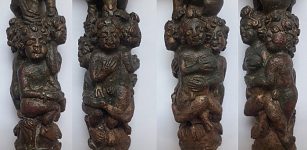 Roman Britain Executions Revealed – New Evidence
Archaeology | Aug 14, 2021
Roman Britain Executions Revealed – New Evidence
Archaeology | Aug 14, 2021 -
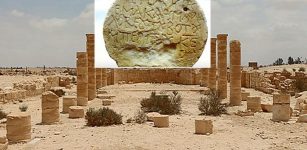 Tombstone With Ancient Greek Inscription Unearthed Near Nitzana In The Negev, Israel
Archaeology | Jan 8, 2021
Tombstone With Ancient Greek Inscription Unearthed Near Nitzana In The Negev, Israel
Archaeology | Jan 8, 2021 -
 European Dogs Doubled In Size From 8,000 To 2,000 Years Ago – New Study Shows
Archaeology | Jun 3, 2022
European Dogs Doubled In Size From 8,000 To 2,000 Years Ago – New Study Shows
Archaeology | Jun 3, 2022 -
 Mysterious Ancient Human Skeletons Found In Florida Lake Puzzle Archaeologists – Unknown Lost Settlement?
Featured Stories | May 21, 2024
Mysterious Ancient Human Skeletons Found In Florida Lake Puzzle Archaeologists – Unknown Lost Settlement?
Featured Stories | May 21, 2024 -
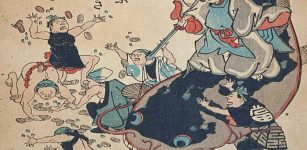 Odd Monster Namazu ‘Earth Shaker’ Was First Feared By People And Later Worshiped As Luminous Deity Repairing The World
Featured Stories | Feb 3, 2024
Odd Monster Namazu ‘Earth Shaker’ Was First Feared By People And Later Worshiped As Luminous Deity Repairing The World
Featured Stories | Feb 3, 2024 -
 Who Were Or Are The Ninja – Those Ancient Spies And Mercenaries?
Featured Stories | Jul 3, 2018
Who Were Or Are The Ninja – Those Ancient Spies And Mercenaries?
Featured Stories | Jul 3, 2018 -
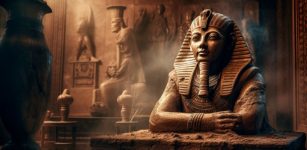 What Did A Day In Pharaoh’ s Life Look Like?
Ancient History Facts | Dec 9, 2019
What Did A Day In Pharaoh’ s Life Look Like?
Ancient History Facts | Dec 9, 2019 -
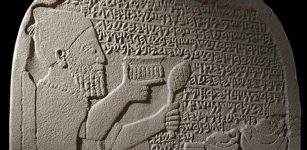 Ancient Kuttamuwa Stele And Iron Age Belief That Soul Lived In Funerary Slab
Featured Stories | Sep 10, 2016
Ancient Kuttamuwa Stele And Iron Age Belief That Soul Lived In Funerary Slab
Featured Stories | Sep 10, 2016 -
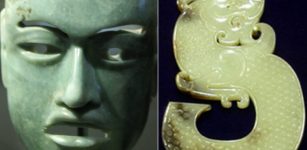 Secret Ancient Powers Of Jade: Sacred Green Healing Stone That Can Conquer Time And Guarantee Immortality
Artifacts | Oct 1, 2016
Secret Ancient Powers Of Jade: Sacred Green Healing Stone That Can Conquer Time And Guarantee Immortality
Artifacts | Oct 1, 2016 -
 Why Did Ancient Humans Have Same Sense Of Smell, But Different Sensitivities?
Archaeology | Jan 6, 2023
Why Did Ancient Humans Have Same Sense Of Smell, But Different Sensitivities?
Archaeology | Jan 6, 2023 -
 Moirai (The Fates): Greek Incarnations Of Destiny And Personification Of A Single, Unavoidable Fate
Featured Stories | Aug 1, 2019
Moirai (The Fates): Greek Incarnations Of Destiny And Personification Of A Single, Unavoidable Fate
Featured Stories | Aug 1, 2019 -
 Unknown Fragments Of Two Euripides Tragedies Found In Egyptian Grave
Scripts, Paintings & Inscriptions | Sep 9, 2024
Unknown Fragments Of Two Euripides Tragedies Found In Egyptian Grave
Scripts, Paintings & Inscriptions | Sep 9, 2024 -
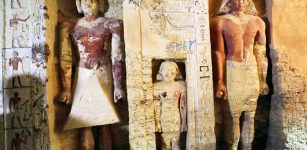 Rare Archaeological Discoveries In The Sacred Animal Necropolis In Saqqara
Archaeology | Apr 26, 2020
Rare Archaeological Discoveries In The Sacred Animal Necropolis In Saqqara
Archaeology | Apr 26, 2020 -
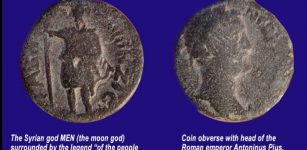 Unique 1800-Year-Old Roman Coin Unearthed On Southern Carmel
Artifacts | Mar 1, 2021
Unique 1800-Year-Old Roman Coin Unearthed On Southern Carmel
Artifacts | Mar 1, 2021 -
 Mystery Of The Ancient Unknown Mining Civilization In North America – Connecting the Dots – Part 2
Ancient Mysteries | Apr 23, 2022
Mystery Of The Ancient Unknown Mining Civilization In North America – Connecting the Dots – Part 2
Ancient Mysteries | Apr 23, 2022 -
 4,500-Year-Old Row Of Giant Monoliths Found – Could Be the Largest In Britain
News | Sep 7, 2015
4,500-Year-Old Row Of Giant Monoliths Found – Could Be the Largest In Britain
News | Sep 7, 2015

